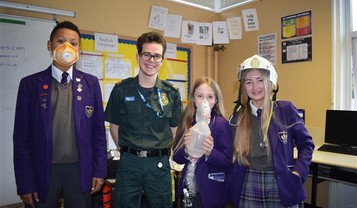The future success and prosperity of the UK in a post-Brexit world will increasingly depend on our ability to harness home-grown talent and to encourage the creativity and innovation of our young people.
(Getting Ready for Work, Ofsted 2016)
Whatever your views on this statement, the one thing I think we would all agree on is more young people need to have experiences of the world of work to help inform their career choices.
The report highlighted the following:
- the extent to which schools used their curriculum to prepare pupils for the world of work was largely dependent on whether school leaders considered it to be a priority.
- even where schools were delivering enterprise education, it was often unclear whether this was having any impact on pupils’ knowledge, understanding and skills.
- opportunities for pupils to take part in meaningful work-related learning or work experience were limited at key stage 4.
- business involvement in some of the schools visited relied too heavily on the personal networks of teachers and parents, potentially resulting in disadvantaged pupils missing out
- a lack of coordination across local areas has created an environment for schools and businesses that business leaders described as ‘chaotic’.
- schools appear to be more likely to promote apprenticeships than in recent years, but parents and pupils are concerned about the quality and reputation of apprenticeships.
The report recommends that secondary schools should:
- ensure that there is a coherent programme to develop enterprise education, including the economic and business knowledge, understanding and skills of all pupils
- develop stronger links with business by using local networks provided by, for example, the chambers of commerce and LEPs, and set clear objectives for the intended outcomes of these partnerships
- make the most effective use of the expertise of their specialist teachers in delivering these programmes and ensure that all teachers involved in delivery have access to appropriate professional development
- ensure that these programmes have effective mechanisms for monitoring and assessing progress in relation to developing knowledge, understanding and skills.
To achieve this and where it works well is when there is commitment by school leaders to enterprise education and having a sufficiently senior member of staff to champion it throughout the school. All learners need to be included with outcomes built into the core components of any programme. Assessing progress against a set of defined criteria is difficult to do but where it is done well this is firmly in place. Professional development for teachers is critical in supporting this as well as linking with employers to get the most up to date information about business activity.
There are challenges for schools to get meaningful employer interactions in schools at a scale that can be impactful. We know that there is an appetite from both schools and business leaders to work more closely together to address the gaps in enterprise education. This is why in Greater Manchester’s business and education communities are coming together under BridgeGM.
Bridge GM will help schools and business pull together one strategy to include a series of impactful activities to support learners. This will include business supporting senior teams with an employer engagement strategy for the whole school via the Careers and Enterprise Company, the National Careers Service Inspiration Team brokering employer links, resources to develop enterprise on bridgegm.co.uk and mentoring opportunities for young people. You can find out more by keeping updated on twitter and through our news section and read the full report in the policy, strategy and research section.



